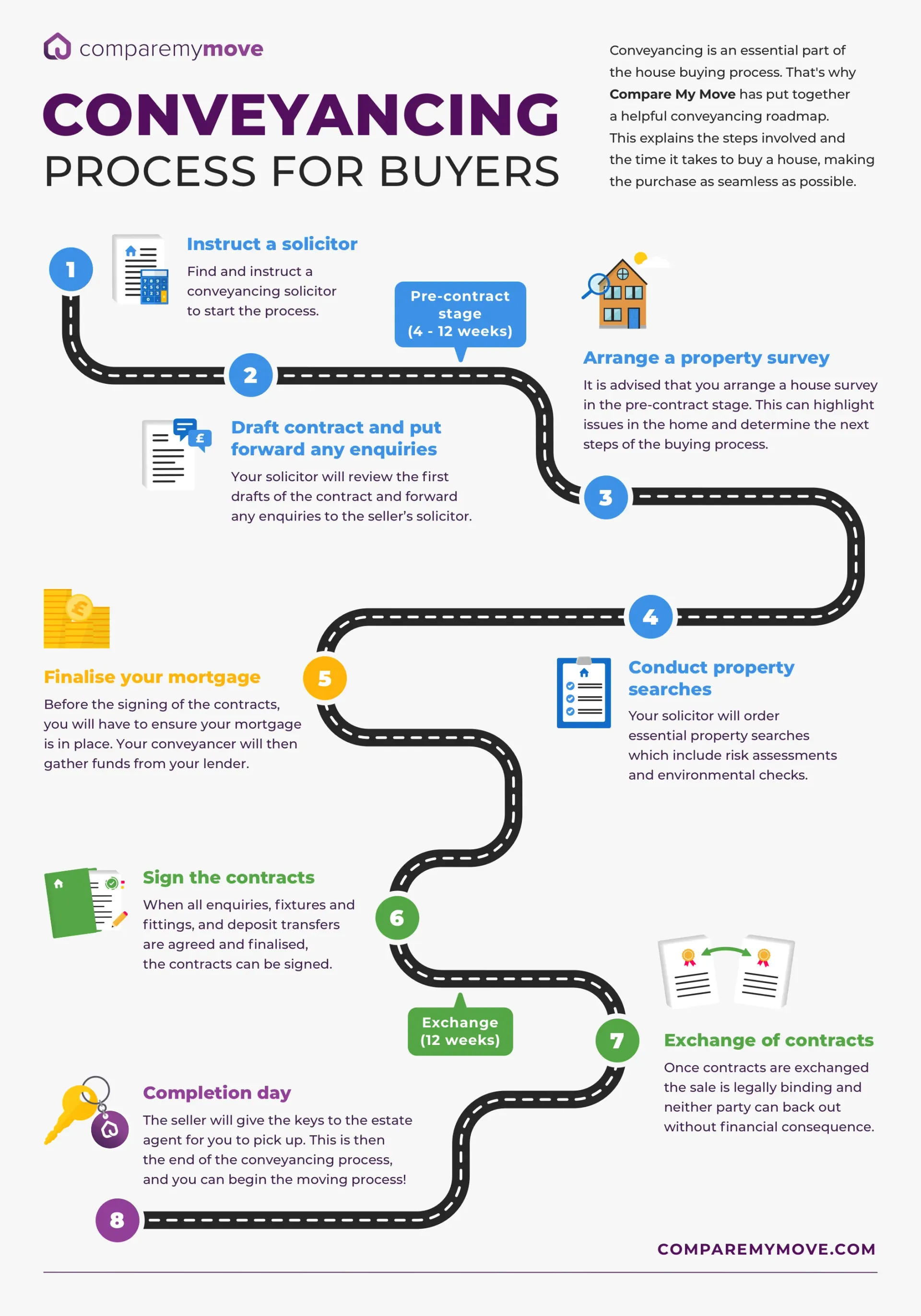What Does A Conveyancer Do?
Table of Contents
- Introduction
- The Role of a Conveyancer
- The Conveyancing Process
- Services Provided by Conveyancers
- Benefits of Hiring a Professional Conveyancer
- Choosing the Right Conveyancer
- Costs of Conveyancing
- Common Conveyancing Issues
- DIY vs Professional Conveyancing
- Frequently Asked Questions
- Conclusion
Introduction
Buying or selling property is likely one of the most significant financial transactions you'll make in your lifetime. Amidst the excitement of finding your dream home or securing a buyer for your property, there's a complex legal process working behind the scenes to ensure the transfer of ownership proceeds smoothly and legally. This is where conveyancing comes into play.
But what exactly does a conveyancer do? If you're new to the property market or it's been a while since your last transaction, understanding the role of a conveyancer is crucial to navigating the property transfer process successfully.
As the Director of Newcastle Conveyancing Services with over 15 years in the industry, I've guided countless clients through this process. In this comprehensive guide, I'll walk you through everything you need to know about conveyancers, their responsibilities, and why their expertise is invaluable when transferring property ownership in Australia.
 Property documents being reviewed during the conveyancing process
Property documents being reviewed during the conveyancing process
The Role of a Conveyancer
What is a Conveyancer?
A conveyancer is a licensed professional who specialises in providing legal advice and services during the transfer of property ownership. They are experts in property law and ensure that their clients' interests are protected throughout the conveyancing process.
"My conveyancer was my guardian angel during my first home purchase. She explained everything in plain English and caught issues I would have completely missed." - Sarah T., Newcastle homeowner
Conveyancers vs. Solicitors: Understanding the Difference
One common source of confusion is the distinction between conveyancers and solicitors. While both can handle property transactions, there are some key differences:
- Conveyancers are specialists who focus exclusively on property transfers. They have specific training and qualifications in property law and conveyancing processes.
- Solicitors have broader legal training and can handle various legal matters beyond property transactions.
In Australia, licensed conveyancers must complete specialised education and practical training, hold professional indemnity insurance, and adhere to strict professional standards. They typically offer more competitive rates than solicitors because they specialise in one area of law.
When Do You Need a Conveyancer?
You'll need a conveyancer's services whenever you're:
- Buying or selling residential property
- Transferring property ownership (e.g., adding or removing someone from a title)
- Subdividing land
- Updating a title (e.g., registering an easement)
- Buying off the plan
- Purchasing an investment property
In my experience, even seemingly straightforward property transactions can become complicated quickly. Having a professional conveyancer from the outset helps prevent costly mistakes and ensures compliance with all legal requirements.
While it's possible to handle your own conveyancing in some situations, the potential cost of mistakes far outweighs the upfront savings. Property law is complex and constantly changing, making professional guidance invaluable.
The Conveyancing Process
The conveyancing process typically follows several key stages, each requiring specific expertise and attention to detail.
 The typical conveyancing process timeline in Australia
The typical conveyancing process timeline in Australia
Pre-Contract Stage
Before contracts are exchanged, a conveyancer will:
- Prepare and review documents: Draft or review the Contract of Sale and other legal documents.
- Conduct preliminary searches: Check for issues that might affect the property, such as planned developments or road widening.
- Provide advice on the contract terms: Explain your rights and obligations and suggest any special conditions that should be included.
- Negotiate terms: Act as an intermediary to negotiate contract terms with the other party's representative.
I recall assisting a client who was purchasing a historic home in Newcastle. During our preliminary searches, we discovered the property was subject to heritage restrictions that would have significantly limited their planned renovations. This discovery before contract exchange saved them from a potentially disappointing and costly purchase.
Contract Exchange
When both parties are ready to proceed, your conveyancer will:
- Manage the exchange of contracts: Ensure all terms are correct and that the deposit is paid and held in trust.
- Advise on cooling-off rights: Explain your rights if you change your mind after signing (though this varies by state and auction purchases typically have no cooling-off period).
- Coordinate with your lender: Ensure your financing is in order and that your lender has all necessary information.
Settlement Period
Between contract exchange and settlement (typically 30-90 days), your conveyancer will:
- Conduct thorough property searches: These include council, water, land tax, roads authority searches and more to identify any issues affecting the property.
- Prepare settlement calculations: Calculate adjustments for rates, taxes and other outgoings.
- Review mortgage documents: Ensure loan documents are correct and ready for settlement.
- Communicate with all parties: Maintain regular contact with the other party's representative and your lender.
- Address any pre-settlement issues: Resolve any problems that arise before settlement day.
During this stage, detailed investigation is critical. Last year, one of our searches revealed unpaid council rates and a building compliance issue on a property our client was purchasing. We were able to negotiate with the seller to resolve these issues before settlement, saving our client considerable expense and hassle.
Never skip property searches to save money. These searches can reveal critical issues such as unpaid rates, planned road developments, or flood risks that could significantly impact your property's value and liveability.
Settlement Day and Post-Settlement
On settlement day, your conveyancer will:
- Attend settlement(in person or electronically): Ensure all documents are signed correctly and funds are transferred.
- Ensure proper title transfer: Make sure the property is legally transferred to the new owner.
After settlement, they will:
- Notify relevant authorities: Inform the council, water authority and other relevant bodies of the change of ownership.
- Provide final documentation: Supply you with copies of all relevant documents for your records.
Services Provided by Conveyancers
Document Preparation and Review
Conveyancers prepare and review crucial legal documents, including:
- Contracts of Sale
- Transfer of Land documents
- Mortgage discharge documents
- Section 32 statements (Vendor's Statement in Victoria) or similar disclosure documents in other states
- Special condition clauses
Having these documents prepared correctly is essential. I've seen cases where poorly drafted contracts have led to disputes, delays, and even failed transactions.
Title Searches
A thorough title search reveals crucial information about the property, including:
- The legal owners
- Mortgages, caveats, or other encumbrances
- Easements or restrictive covenants
- Historical information about the property
One client was particularly grateful when our detailed title search revealed an unregistered easement that gave neighbours the right to access part of the property they were purchasing. This information allowed them to negotiate a lower purchase price to account for this restriction.
Settlement Coordination
Coordinating settlement involves:
- Booking the settlement time and venue (if physical)
- Ensuring all documents are prepared correctly
- Making sure all funds are available
- Handling last-minute issues that might arise
With the shift to electronic settlements through platforms like PEXA, this process has become more streamlined but still requires careful management.
Dealing with Financial Institutions
Conveyancers liaise with banks and lenders to:
- Ensure mortgage documents are prepared correctly
- Coordinate the discharge of the seller's mortgage
- Arrange for the settlement funds to be available at the right time
Council and Regulatory Compliance
Conveyancers ensure compliance with various regulations by:
- Checking for outstanding council orders or notices
- Verifying zoning and permitted land use
- Confirming building approvals for any renovations or additions
- Checking for contamination issues or environmental concerns
Keep a folder of all your property documents, including those provided by your conveyancer after settlement. These can be invaluable for future property transactions or if any issues arise with the property.
Benefits of Hiring a Professional Conveyancer
 A successful property settlement meeting between client and conveyancer
A successful property settlement meeting between client and conveyancer
Risk Reduction
The legal transfer of property involves significant risks if not handled correctly. Professional conveyancers:
- Identify potential issues before they become problems
- Ensure all legal requirements are met
- Protect your legal interests throughout the transaction
"After trying to handle my first property purchase myself and nearly making a costly mistake with the contract, I'll never go without a conveyancer again. The peace of mind alone is worth every cent." - Michael R., Lake Macquarie
Time and Stress Savings
The conveyancing process involves numerous time-consuming tasks:
- Multiple searches and investigations
- Detailed document preparation
- Coordination with various parties
- Adherence to strict timeframes
Having a professional handle these tasks saves you considerable time and reduces the stress associated with property transactions.
Expert Knowledge of Local Regulations
Property laws and regulations vary between states and territories in Australia. Local conveyancers have specific knowledge of:
- State-specific legislation and requirements
- Local council regulations
- Regional issues that might affect properties in the area
In Newcastle, for example, certain areas have specific mine subsidence considerations that must be addressed during property transactions – something an experienced local conveyancer will know to check.
Handling Complex Situations
Not all property transactions are straightforward. Complex situations that benefit from professional conveyancing include:
- Properties with building or compliance issues
- Transactions involving deceased estates
- Properties with multiple owners
- Rural properties with specific considerations
- Off-the-plan purchases
Choosing the Right Conveyancer
Qualifications to Look For
When selecting a conveyancer, check for:
- Proper licensing with the relevant state authority
- Membership in professional associations such as the Australian Institute of Conveyancers
- Professional indemnity insurance
- Experience with your specific type of property transaction
Questions to Ask Potential Conveyancers
Before engaging a conveyancer, ask:
- How long have you been practising conveyancing?
- Have you handled transactions similar to mine?
- What are your fees and what do they include?
- What additional disbursements might I need to pay?
- How will you communicate with me throughout the process?
- What is your typical response time to queries?
Red Flags to Watch Out For
Be cautious if a conveyancer:
- Cannot clearly explain their fee structure
- Is difficult to contact or slow to respond
- Seems unfamiliar with local property issues
- Cannot provide references or testimonials from previous clients
- Pressures you to make decisions quickly
A conveyancer familiar with the Newcastle area will understand specific local issues such as mine subsidence, flood-prone areas, and council zoning matters that might affect your property transaction.
Costs of Conveyancing
Fee Structures
Conveyancing fees typically include:
- Professional fees: The cost of the conveyancer's time and expertise
- Disbursements: Out-of-pocket expenses such as search fees, registration fees, and other costs incurred during the process
Most conveyancers charge either a flat fee or an amount based on the property's value.
| Service | Approximate Cost Range (AUD) |
|---|---|
| Basic Conveyancing Fee | $800 - $1,500 |
| Title Search | $20 - $50 |
| Council & Water Searches | $50 - $200 |
| Land Tax Certificate | $25 - $50 |
| PEXA Fees (electronic settlement) | $100 - $200 |
Note: These figures are indicative only and may vary depending on location and complexity of the transaction.
Additional Costs to Consider
Beyond the basic conveyancing fee, be prepared for:
- Title search fees
- Council and water authority search fees
- Land tax clearance fees
- Registration fees
- Settlement attendance fees
- PEXA fees (for electronic settlements)
A good conveyancer will provide a detailed cost estimate upfront, so you aren't surprised by additional charges.
Value for Money Considerations
When assessing conveyancing quotes, remember that the cheapest option isn't always the best value. Consider:
- The conveyancer's experience and specialisation
- What services are included in the quoted fee
- Their communication style and accessibility
- Local knowledge and reputation
Beware of quotes that seem significantly lower than others. These might not include all necessary searches or services, potentially leaving you exposed to risks or facing unexpected additional costs later.
Common Conveyancing Issues
Potential Pitfalls
Even with professional help, issues can arise during conveyancing:
- Title problems: Incorrect names on titles, unresolved caveats, or other title defects
- Survey issues: Boundary disputes or encroachments
- Finance delays: Lenders not being ready by settlement date
- Building and pest problems: Inspections revealing issues that need negotiation
- Chain breaks: When related transactions (like the seller's purchase of their next home) fall through
How Conveyancers Resolve Problems
Experienced conveyancers have strategies for handling common issues:
- Negotiating extensions when needed
- Finding solutions to title problems
- Drafting special conditions to address specific concerns
- Liaising with all parties to resolve disputes
- Advising on legal rights when agreements break down
Having handled thousands of property transactions, I've encountered most issues that can arise and have developed effective strategies for resolving them efficiently.
DIY vs Professional Conveyancing
Risks of Handling Your Own Conveyancing
While it's legally possible to handle your own conveyancing in most states, consider these risks:
- Missing critical searches or misinterpreting results
- Overlooking important contract clauses or conditions
- Being unaware of your legal rights and obligations
- Mistakes in preparation or lodgement of documents
- Not knowing how to resolve issues that arise
A property transaction involves one of your largest financial investments. The potential cost of mistakes far outweighs the savings from DIY conveyancing.
Last year, a client came to us after attempting DIY conveyancing on a previous property purchase. They had missed an easement that significantly affected their ability to build a garage. The legal costs to resolve the issue far exceeded what professional conveyancing would have cost.
When Professional Help is Essential
Professional conveyancing is particularly important when:
- The transaction involves unusual features or complexities
- You're unfamiliar with property law
- You don't have time to manage the detailed process
- There are tight timeframes involved
- The transaction involves significant financial value
Frequently Asked Questions About Conveyancing
How long does the conveyancing process take?
The time from engagement to settlement typically ranges from 30 to 90 days, depending on the complexity of the transaction and the agreed settlement period. The most time-intensive work happens between contract exchange and settlement.
When should I engage a conveyancer?
Ideally, engage a conveyancer before signing any contracts or making any offers. For sellers, this means before listing your property; for buyers, before making an offer or bidding at auction.
Can I change conveyancers partway through a transaction?
Yes, but it can cause delays and complications. Your new conveyancer will need to be brought up to speed, and you'll need to pay for work already completed by your original conveyancer.
What's the difference between conveyancing in different Australian states?
Each state and territory has its own property laws, required documentation, and processes. For example:
- In NSW and Victoria, contracts of sale are exchanged fairly early in the process
- Queensland has a longer cooling-off period than other states
- Western Australia uses an "Offer and Acceptance" document rather than a Contract of Sale
- South Australia requires a specific form of vendor disclosure
Do I need a conveyancer for an off-the-plan purchase?
Absolutely. Off-the-plan purchases involve additional complexities and risks, including:
- Extended timeframes
- Potential for developer variations
- Sunset clause considerations
- Staged completion issues
These transactions particularly benefit from expert conveyancing advice.
What happens if settlement is delayed?
If settlement is delayed, there may be financial penalties depending on the contract terms. Your conveyancer will negotiate with the other party to minimise any negative consequences and keep the transaction on track.
Conclusion: The Value of Expert Conveyancing
The property transfer process in Australia involves navigating complex legal requirements, conducting thorough investigations, and managing relationships between multiple parties. A professional conveyancer ensures this process runs smoothly, protecting your interests and giving you peace of mind during what can be a stressful time.
At Newcastle Conveyancing Services, we've spent over 15 years helping clients throughout Newcastle and beyond navigate their property journeys successfully. Our local knowledge, combined with our conveyancing expertise, ensures your property transaction proceeds as smoothly as possible.
Whether you're a first-time buyer, an experienced investor, or selling a family home, professional conveyancing is an investment in security and peace of mind. The cost of conveyancing is minimal compared to the value of the property and the potential costs of mistakes.
Ready to Get Started?
If you're buying or selling property and need expert conveyancing support, contact Newcastle Conveyancing Services today. Our team of licensed conveyancers is ready to guide you through every step of the process, ensuring your property transaction is handled with the care and expertise it deserves.
Contact Us TodayReferences
[1] Australian Institute of Conveyancers. (2024). What is a Conveyancer?
[2] NSW Fair Trading. (2023). Property Transfers and Conveyancing
[3] Legal Services Commission of South Australia. (2024). Buying and Selling Property
Ready to work with Newcastle Conveyancing Services?
Let's connect! We’re here to help.
Send us a message and we’ll be in touch.
Or give us a call today at 0489 073 400


